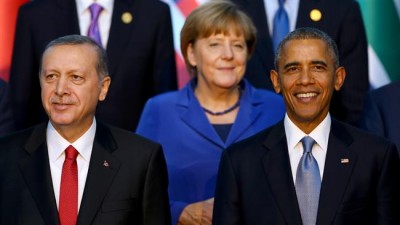Angela Merkel, Refugees and the Cologne Acts of Sexual Violence

Huge pressure was already on Angela Merkel’s shoulders prior to the New Year celebrations. When it came in its waves of chaos on the eve, the security services in Cologne were found wanting. The police document from Cologne, leaked to Der Spiegel, speaks of chaos and lack of control. “Women, accompanied or not, literally ran a ‘gauntlet’ through masses of heavily intoxicated men that words cannot describe.”[1]
A range of activities, altogether some 170 criminal acts, are documented: women being surrounded by gangs of men; unwanted hands being laid on clothing, grabbing between legs, buttocks, and breasts, and a good bit of thieving for good measure.
It also outlines a considerable inability to identify and prosecute the alleged offenders, even instances of disbelief and confusion in the face of such violence. Screams of help were ignored. The police involved were short of personnel, vastly outnumbered.
It was a boon for the reactionary right, but it was also a bitter reality for those keen on pursuing injustices to persons caught in sexual violence. Eyes have been on such statements in the leaked police report as that of a man who yelled: “I’m Syrian! You have to treat me kindly! Frau Merkel invited me.”
The result has been a besmirching of a range of positions – feminists accused of not doing enough by preferring political correctness over attacking gender hatred; progressives accused of being apologists; and a general sense that discussions of the refugee problem have ignored the dimension of gender.
Tempting as the last option is, the numbers simply do not hold up to scrutiny, at least in terms of violent sexual avalanche. It is reported that some 32 individuals came out of 1,000 young men were supposedly involved in a range of sexual crimes. They comprise nine Algerians, eight Moroccans, five Iranians, four Syrians, three Germans, one Iraqi, one Serb, and one American. A subsequent report from the Interior Ministry in North Rhine-Westphalia (NRW) state notes that 516 criminal complaints were registered, 237 being criminal in nature.
Merkel seems to be on a hiding to nothing. She has had a diminishing luxury in terms of how she deals with refugees. The huge numbers have presented an alibi for increasing hostility within Germany, and a considerable headache for her ruling coalition. It is precisely such a number that conjures up images of a loss of control, the borderless nightmare.
Anger is being registered across party circles and certain figures. Carsten Linnemann, a member of the Christian Democrats (CDU), has claimed that, “If the influx continues as it has, then integration can’t work.” Merkel has consistently insisted on how, “Wir können das schaffen, under wir schaffen das.”[2] (We can handle this, and we will handle this.)
To Merkel’s “we can do this” message, Linnemann showed less enthusiasm. “If we get another 800,000 or a million people arriving this year, then we won’t be able to do this.”[3]
The Alternative for Germany (AfD) have seen their chance to pounce. Dirk Driesang needed a provocative image to use, and decided that Egypt’s Arab Spring protestors supplied one. “Anyone who opens the borders wide must know they are bringing Tahrir Square to Germany.”
Noisy Pegida protesters made their presence felt in Leipzig, though a police spokeswoman did confirm that they were met person to person by counter-demonstrators. Cologne has seen retaliations, leading to injuries on 11 individuals, including Pakistanis, Syrians and Guineans.
The new policy in itself will not make an overwhelming difference in terms of expulsion. Offenders, insisted Merkel, “must feel the full force of the law.” The “right to asylum can be lost if someone is placed on probation or jailed.” Asylum remains a legal principle controlled by legal regulation and qualification.
There is nothing new or provocative about this, though some parties on the left insist that her supposedly revised stand involved “shooting from the hip”. But Merkel has so far resisted the move to introduce the notorious cap on numbers, and the Hungarian solution of closing borders. Were Germany to do that, it would certifiably kill off the Schengen zone and the principle of mobility.
The issue of gender violence, and its appropriation by various groups for a protection agenda, was never far away from the incidents. The Mayor of Cologne, Henriette Reker, did not make matters any easier by suggesting that women had failed in their endeavours of self-protection. They would do better than to keep strangers “at an arm’s length”. That said, she also claimed on Tuesday that, “There are no indications that this involved people who have sought shelter in Cologne as refugees.”[4]
The more balanced view is that a handful of criminal actions do not, by their nature, criminalise an entire fleeing populace. Many of the refugees currently in Germany can count themselves as survivors of sexual abuse, one of the inglorious nasties of war and conflict.
An interesting contrast would be to assess hefty, alcohol-fuelled acts of domestic violence on New Year’s that happen among local nationals every year. Leave the patriotic nonsense aside, and get into the social policy. Now that might provide an interesting corrective for the fatherland conservative types worried about nationalist, gendered pollution from Africa and the Middle East.
Notes:
[2] http://www.spiegel.de/politik/deutschland/merkel-und-faymann-zur-fluechtlingskrise-a-1053051.html
[3] http://www.reuters.com/article/us-germany-assaults-idUSKCN0UP0Y220160112

